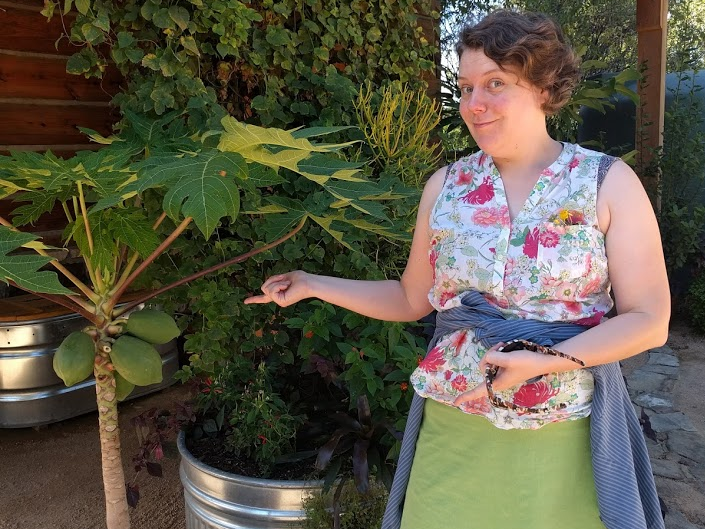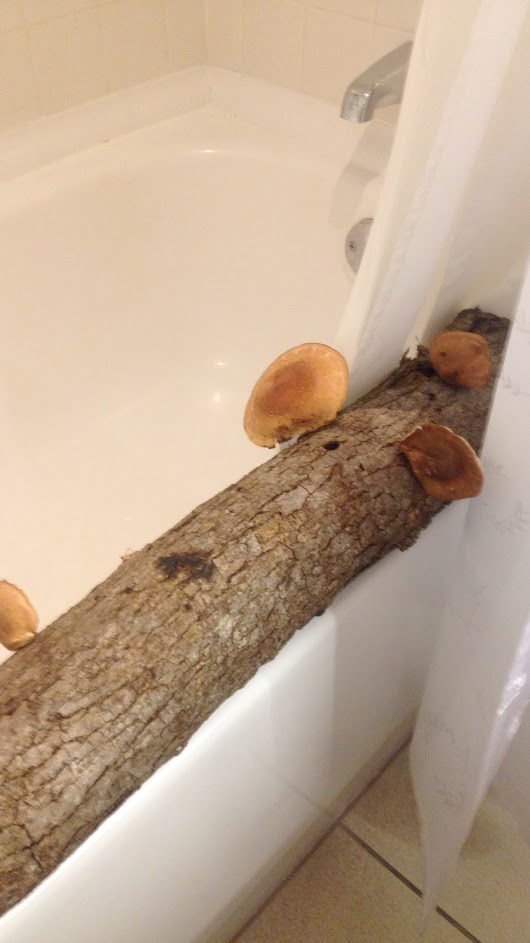by Ashley See, CFSA Communications Coordinator | Tuesday, Sept. 8, 2020 –
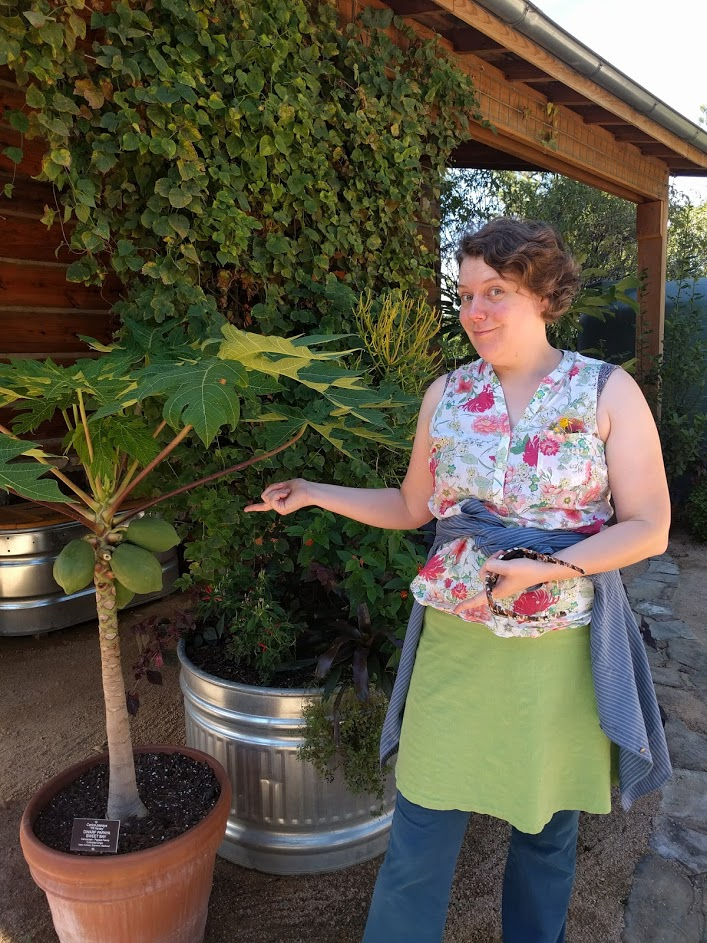
Here at CFSA, we’ve been wanting to give readers an opportunity to get to know our staff better. Beyond job titles and duties, what interests, passions, and hobbies do the staff of the Carolina Farm Stewardship Association have?
For this second post in the series, we’re introducing Claire McLendon, CFSA Grants Coordinator. Originally from Weaverville, North Carolina, Claire works out of CFSA’s headquarters in Pittsboro—normally, anyways—and currently lives in Carrboro. She plays a critical role in helping sustain CFSA’s fundraising efforts. How we managed to get someone with an equal love for sustainable farming and spreadsheets, we’ll never know!
Now that you’re loosely acquainted, we’ll hand it over to Claire.
Tell us your food story. What brought you to local food and farming?
I’ve always been really interested in food and farming as the most fundamental place where human beings interact with the natural world.
Claire: In my family, we’re big environmentalists, and I’ve always been really interested in food and farming as the most fundamental place where human beings interact with the natural world. I majored in sustainable development at Appalachian State (a long, long time ago) and my professors there, especially Dr. Cynthia Wood, really encouraged me to view how a civilization feeds itself as one of the most fundamental human questions. So I guess the answer is that I got here via the very, very big picture—which is funny because my work is so down in the weeds of grant contracts and paperwork! But that big picture is what keeps me engaged.
You’ve been at CFSA since 2018. What are some of the duties of your position that delight you the most?
Claire: Since we’ve been working offsite due to the pandemic, I’ve realized how much I loved answering the phones! Sometimes it’s distracting when I’m in the middle of editing something, but I loved interacting with our members. And, of course, any time we have a big fundraising win; I love this job because I believe in the work that we do, but of course doing that work takes resources, so feeling like I’m supporting our farmer-facing and policy staff so directly really makes it meaningful.
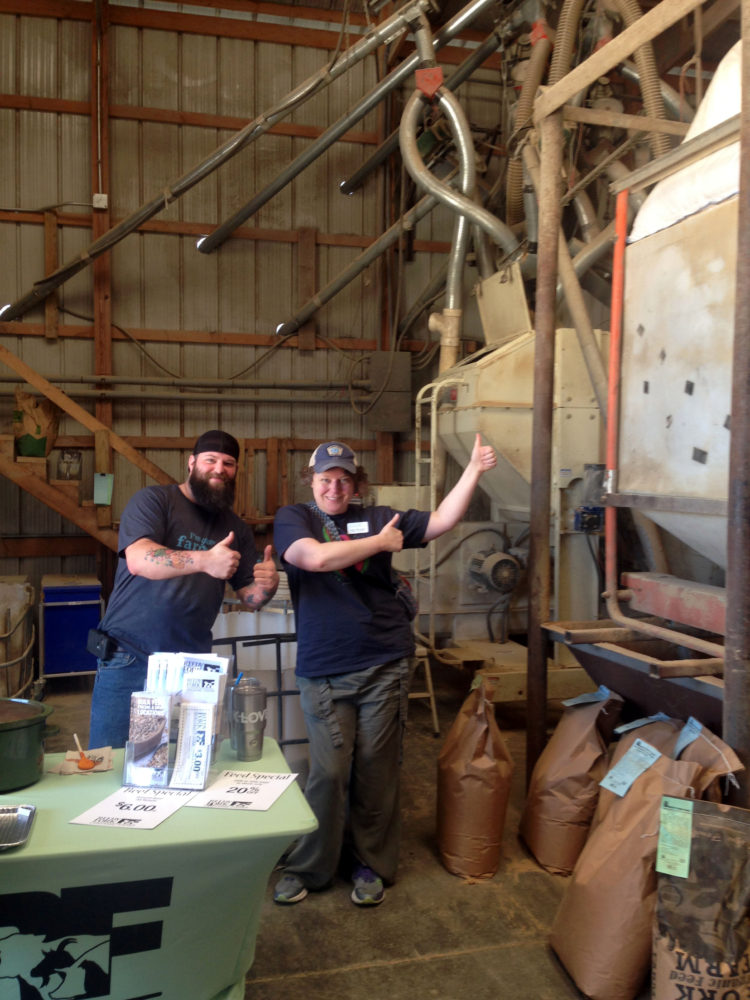
Claire and Joe Mitchell, Reedy Fork Farm Feed Mill Manager, admire the mill machinery on the 2019 Piedmont Farm Tour
When you’re not writing grants or wrangling the CFSA staff for reports, what does life outside of CFSA look like?
Claire: My terrible secret is that I’m an AWFUL gardener. Just awful. I cannot make anything grow. I think I don’t have the right mindset; I’ll create a beautiful garden plan for the season, lay everything out, and then get sidetracked. So the answer is in large part “gardening badly”. I also have a menagerie of pets who run my life—two birds, a dog, and the loudest cat in the world.
The best work bonus I’ve ever gotten: At the 2019 Sustainable Agriculture Conference, I helped with the workshop at Haw River Mushrooms and Laura Stewart gave me a fruiting log! I had to store it in the hotel bathroom until the conference was over.
What a time to be educated in public health and have experience as a farmers market manager. What advice would you give to people who want to work in mission-driven fields?
Claire: Develop a special skill that’s pretty portable. Public health school was a great experience, but what I really got out of it was understanding how grantmakers think about program design and planning. I could work in grants in many different fields but this is the one I’m passionate about, so bringing those skills to CFSA felt great.
We all have something we’re hyper nerdy for. A little birdy told us that you love Excel. Where does this love come from and how is it currently cropping up?
If Excel was a person, I would marry it.
Claire: If Excel was a person, I would marry it. I know all of its flaws; I know I should upgrade to Python. I learned SQL and SAS in school but I love how approachable Excel is and how no one who gets really into spreadsheets thinks they’re programming, even though they are!
If you could have a farm anywhere and only grow and eat three crops (ignoring all practicality) where would it be and what would you grow?
Claire: Figs, pawpaws, blackberries. I love the Southeast summer fruits and I never get enough of them. Same answer to “if I had a million dollars and couldn’t spend it on anything practical”. I feel like I could get through a million dollars in figs and pawpaws over the course of my life.
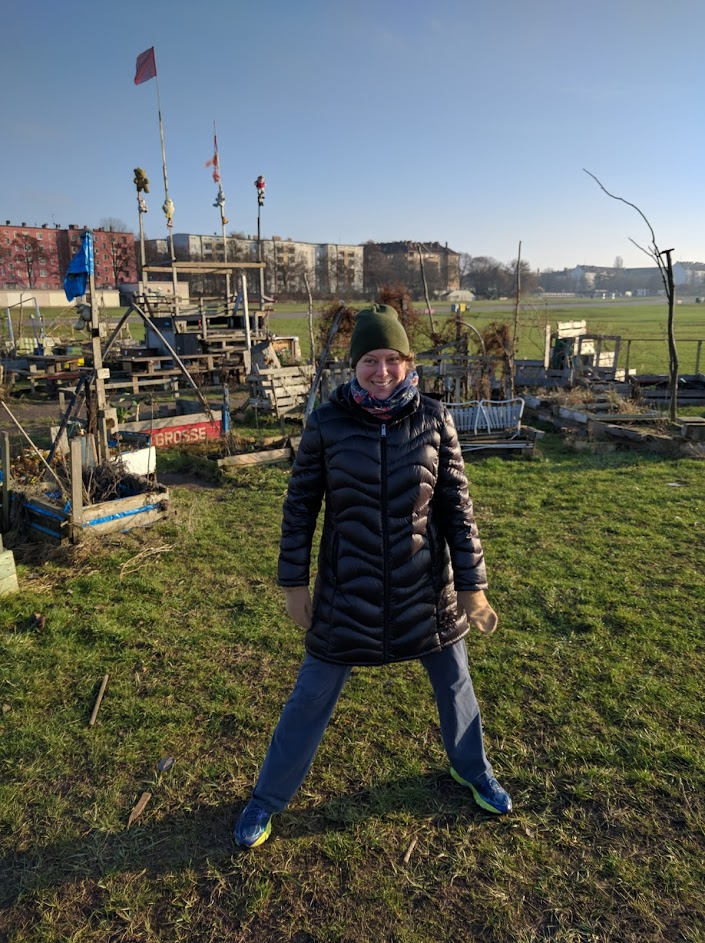 I’ve only been to Europe once and almost caused a family fight by dragging my brother around the community garden in Templehopf for an hour instead of going to lunch. It was also winter and freezing cold, but you could figure out what everyone HAD grown from the way the beds were laid out!
I’ve only been to Europe once and almost caused a family fight by dragging my brother around the community garden in Templehopf for an hour instead of going to lunch. It was also winter and freezing cold, but you could figure out what everyone HAD grown from the way the beds were laid out!
What are you reading right now and what recipe are you obsessed with?
Claire: My mother just sent me The Library of the Unwritten by A.J. Hackwith because I used to work in libraries and the main character is named Claire!
I’m a by-the-seat-of-my-pants cook, but I’ve been making variations on Bon Appetit’s make-ahead lentil salad all summer and I’m not sick of it yet.
Given the choice of anyone in the world, who would you want as a dinner guest?
Claire: Ursula Le Guin, RIP. I’m in this field because I think the question of how we build a more just world is fundamentally an unglamorous question about how our society sustains itself. Her writing really asked those questions of what the world could look like, using science fiction as a medium. I’m sure I would make a huge fuss over her and embarrass her, but I’ll bet she’d like that lentil salad.
Lastly, what do you wish folks in the food and farming community discussed more?
How we treat the people who grow our food is a question that no civilization in history has really answered well yet.
Claire: I’m really glad that the food and farming community is coming around to more discussion of racial and economic justice, especially for meatpacking and produce workers. Dr. Wood used to say that the question of how we treat the people who grow our food is a question that no civilization in history has really answered well yet. She would tell us that that means that there’s a huge opportunity there—maybe we’ll be the ones to figure out how to do it right.
Whether you love Excel as much as Claire does, have a question, or just want to say hello, Claire can be reached at claire@carolinafarmstewards.org.


